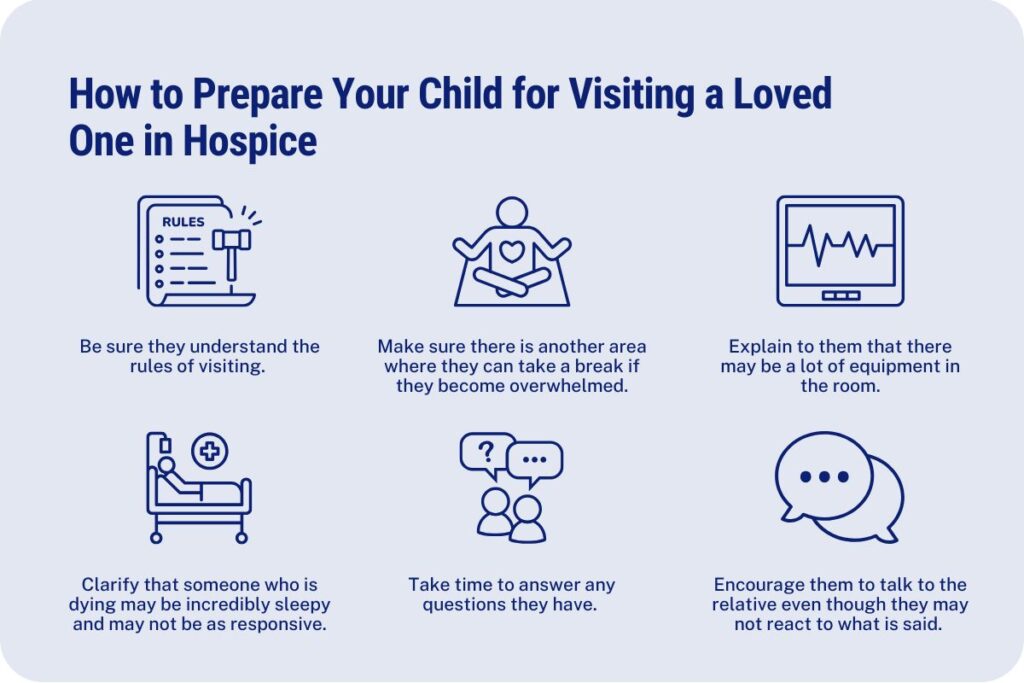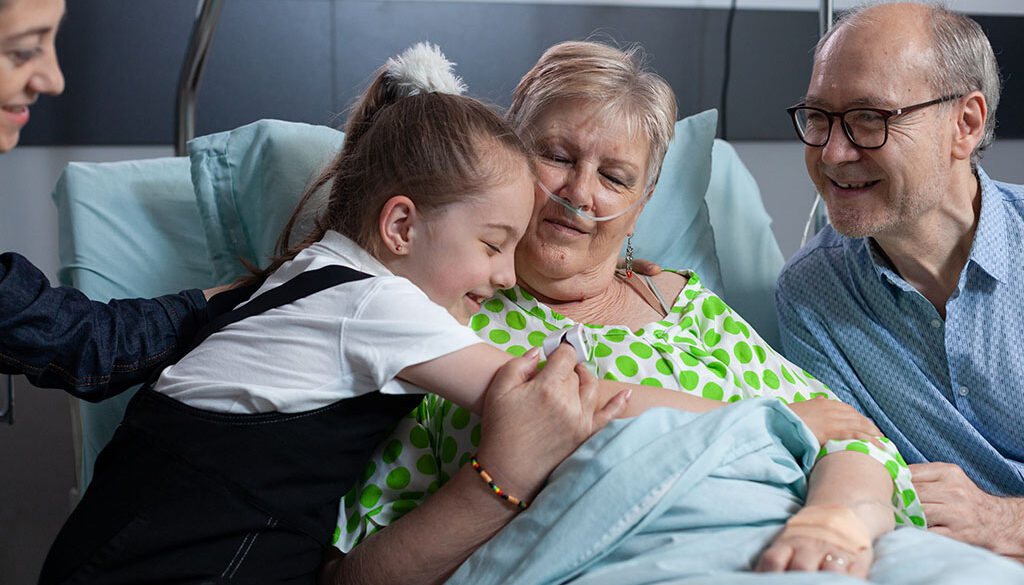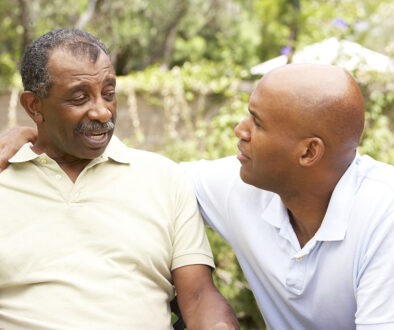Should You Take A Child To Visit A Relative In Hospice?
For children, it can be difficult to watch someone they love transition through hospice, so the question arises over should you take a child to visit a relative in hospice?
While there is no one blanket answer that covers all situations, we believe that a visit can benefit both the child and the hospice patient. However, no child should be pushed or coerced into seeing a dying relative, and there may be times when a visit is not appropriate. We’ll explore common concerns and tips for having a meaningful visit.
First, let’s look at the dilemma of should you take a child to visit a relative in hospice?
Should You Take a Child to Visit a Relative in Hospice?
5 Common Concerns About Children Seeing Their Loved Ones In Hospice
1. Protecting the Child From Trauma
The loss of a loved one is an emotional toll for everyone involved. Many parents may be afraid that visiting a dying relative will traumatize their children and they won’t be able to process their emotions.
However, children are often more perceptive and insightful than we give them credit for. In some cases, shielding a child from the reality of death may make it more difficult for them to cope with later. Remember that if your child does not get clear direction from you, their imaginations may create ideas that are far more frightening.
2. Being Too Young to Understand Death
Certainly, young children do not understand death the way adults do. The best way to equip your child is to explain in age-appropriate terms what is happening. Grade schoolers have a better comprehension of death than younger children, and you should be calm, direct and concise when you speak to them. Be prepared for questions they may ask, and don’t be afraid to reach out to members of our hospice team for advice and assistance. After all, we consider you a part of our family.
3. Being a Burden to the Family or Dying Relative
Should you take a child to visit a relative in hospice? And if you do, will your child behave?
Children are unpredictable, and many are understandably concerned that a stressed child could act out or bring more problems into an already complicated and emotionally intense situation. The key is to support and prepare your child for the visit beforehand. (We’ll go into some details on how to do that later on in this article.)
4. Inability to Process Emotions
Children will experience a wide range of emotions and be aware that they may express them in ways that are very different from adults. They can have difficulty processing their feelings, but this does not mean that they are unable to. It takes time, patience, and the realization that children may not express their feelings right away. It can be much later that they begin to work through their grief.
At 3HC we provide healing, helpful resources to assist your child in processing their loss. Through our Wings Camp, your child can interact with others who are going through similar situations, creating a source of comfort and growth. All of our camp staff and volunteers have received specialized training in how to help young people process these emotions
5. Inability to Say Goodbye
Should you take a child to visit a relative in hospice? Will they be able to say a meaningful goodbye? How to tell a child about the death of a grandparent?
First, be wary of how you define the word “meaningful.” There is no one way to say a heartfelt goodbye. In fact, you’ll discover that your child will have a unique and genuine way of expressing their feelings and love.
Can Children Visit Hospice Patients?
Yes, they can, and while it can be meaningful for all involved, every individual case has to be carefully considered. Take into account the following factors:
- Your child’s age and maturity level
- The condition of the hospice patient
- Family dynamics
- Level of preparation
- The ability to adequately supervise your child
- The duration of the visit
Is There a Time When Your Child Should NOT See a Relative in Hospice?
As we’ve mentioned earlier, while visits are typically beneficial to both the child and the patient, there are times when you should reconsider. Every child is different, and the key is getting to know your child and their maturity level.
If any of the following are true, you may wish to reconsider should you take a child to visit a relative in hospice?
- Your child is very young and not emotionally mature or prepared enough for the visit.
- The hospice patient is in a fragile condition and in severe pain or distress. Visiting under these circumstances would be overwhelming to both the child and the patient.
- There are strained family relationships.
- Your child is sick with a contagious illness—this could affect the health of the hospice patient, who may have a compromised immune system. If the hospice patient is not being cared for at home, and is in an environment like our hospice care centers, your child’s illness could also place other patients at risk.
- The patient does not wish for them to visit.
- The child doesn’t have the support to help them process the powerful emotions that accompany a visit.
How to Prepare Your Child for Visiting a Relative in Hospice?

3HC: Because We Know that Caring For Our Patients Means Being There for Their Families as Well
We know how important it is to have the best care when your loved one faces the end of their journey. We also realize that death has a ripple effect that transforms the lives of so many of the patient’s loved ones.
That’s why we consider you a part of our family. That’s why we give you the crucial care, comfort, and support that you need. 3HC has been providing compassionate care for decades for North Carolinians from the Triangle area to the coast. Not sure where to begin? Just contact us for information.





